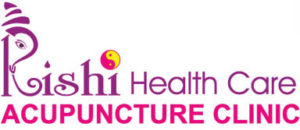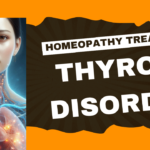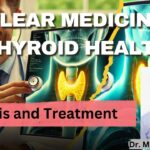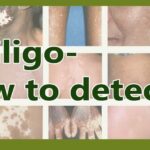Thyroidism problem can be effectively cured by accupuncture treatment along with some lifestyle changes.
The Thyroid gland is a butterfly-shaped gland located in the neck, secreting thyroid hormones. The hormones produced by this gland have two primary functions: they enhance protein synthesis and oxygen utilisation. These physiologic activities, in turn, influence the Basal Metabolic Rate (BMR) or the processes by which the body uses energy. The level of Thyroid hormone production is determined by levels of Thyroid Stimulating Hormone (TSH) released from the pituitary gland. The Thyroid produces a hormone called Tri-iodothyronine, known as T3. It also produces a hormone called Thyroxine known as T4. Together, these hormones regulate our body’s temperature, metabolism, and heart rate.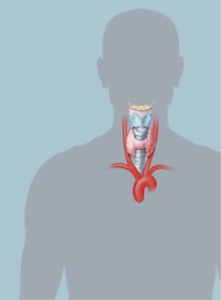

When hormones are not secreted properly, the two conditions may occur – Hypothyroidism and Hyperthyroidism.
In Hyperthyroidism, the Thyroid gland produces too much Thyroxine or Tri-iodothyronine and speeds up the body’s metabolism. It is also known as overactive Thyroid gland.
Symptoms for Hyperthyroid are: insomnia, fatigue, anxiety, weight loss, menstrual problems, sweating, poor memory etc.
Hyperthyroidism is diagnosed when TSH is suppressed and FT4 or FT3 levels are higher than the normal reference range. Subclinical Hyperthyroidism is diagnosed when TSH is suppressed but FT4 and FT3 levels are within the normal reference range. Clinical symptoms and signs are typically absent, mild, or non-specific in people with subclinical Hyperthyroidism.
Hypothyroidism or under active Thyroid occurs as a consequence of deficient secretion by the Thyroid gland.
Symptoms for hypothyroidism:
Symptoms for hypothyroidism are depression, goiter, dry hair, dry skin, weight gain, brittle nails, fatigue, constipation etc. Hypothyroidism is diagnosed by a serum Thyroid-stimulating hormone (TSH) concentration above the normal reference range and a serum free Thyroxine (FT4) concentration below the reference range. Subclinical Hypothyroidism is diagnosed by a TSH concentration above the reference range with an FT4 concentration within the reference range. In both the cases patient may or may not experience the symptoms.
Acupuncture for hypothyroidism:
Acupuncture Treatment has a holistic perspective in the development of diagnostic impressions and treatment procedures for every patient. The purpose of treatment is to awaken the natural ability of the body to heal itself. Acupuncture treatment seeks the root cause within the patterns of imbalance, which determines to be a deficiency of Kidney and Spleen energy.
There are 8 acupuncture networks which are directly or indirectly linked with the thyroid gland round the neck. These are the Stomach, Kidney, Gall Bladder, Liver, Bladder, Spleen, San Jiao and Small Intestine channels.
Acupuncture approach to hypothyroidism is Yang Deficiency in which the function of the body to warm, motivate and transform is insufficient. The primary organ systems that are included are the Spleen and Kidney, also the Heart organ system becomes more involved in the advanced stage.
According to Acupuncture, Hyperthyroidism is a combination of Qi (energy) and Yin inadequacy, Liver fire uprising and phlegm stagnation. Qi and Yin inadequacy is the fundamental cause, while the symptoms and signs show Liver fire and phlegm stagnation.
1. Eating fresh vegetables and fruits will help you maintain thyroid and overall health. You should also eat vegetables and fruits high in antioxidants, such as onion, ginger tea, cherries, tomatoes, capsicum etc.
2. However, when you are working toward thyroid health, you need to know which kind of thyroid issue you suffer from because some vegetables can be more harmful than helpful. For example, if you are suffering from hypothyroidism, you should avoid anything in the cabbage family, spinach, broccoli, soy beans etc. These foods interfere with thyroid function.
3. It is good to avoid eating and drinking frozen and very cold items straight from the refrigerator. It’s good to bring them to room temperature before eating. Avoid consuming salads and raw food during winter.
4. Every spoonful of yogurt (Curd) acts as a protective shield for your thyroid. That’s because yogurt is naturally rich in Vitamin D, and not getting enough of the nutrient puts you at a higher risk of obesity and thyroid diseases. (Taking curd at night may lead to mucus formation and phlegm stagnation). Adding table salt to our daily diet is advisable, as it is the primary source of Iodine, required by our body.
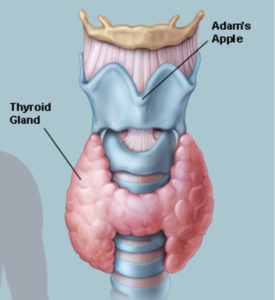

Lifestyle and exercise suggestions for hypothyroidism:
1. People who experience these symptoms are better suited to being in warm and sunny environments.
2. Avoid living in damp and cold environments.
2. It is best to choose warm colors to decorate your home such as red or orange.
3. Get plenty of sunshine, at least 30 minutes a day.
4. Slightly vigorous exercise is suitable, but ensure that the exercise you do is suitable for your body’s energy levels.
5. If your body feels very tired the next day, this is a sign you did too much exercise the previous day.
Hyperthyroidism:
1. Diet suggestions – Avoid eating spicy and hot flavored foods such as ginger, chili, onion, pepper, garlic etc. Eat more cooling foods such as cucumber, watermelon, pear, green vegetables, fish, green tea, peppermint tea.
2. Lifestyle and exercise – It is most suitable for people with overactive thyroid symptoms to stay and live in cool environments. Especially exercising in cool and green environments such as gardens, parks and forests.
You can decorate your living area with green, blue and white colors. (Preferably light colors)
Note:
1. Yin and Yang are two major aspects of vital energy. We can also call it as two polarities of same objects / substance / energy / nature / human etc… These are said to be opposite but interdependent, where one cannot exist without the other.
2. If the patient is accompanied with any other health conditions along with Thyroid, then we suggest consulting his/her doctor before following any of the above guidance.
For any clarifications or questions, you can contact RISHI ACUPUNCTURE CLINIC, Mathikere, Bangalore. Also whatsapp on 98442 65625, 9986073931 with your personal details.
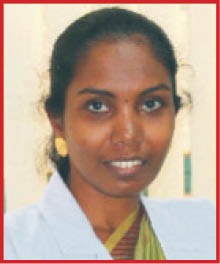

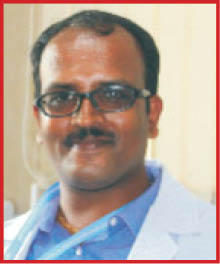

DR. GOWRI B. N. DR. VENKATESH PRASAD K. N.
No.2, 1st Cross, 7th Main Mathikere, Near Canara Bank, Bangalore – 560 054.
Contact : 9844265625 / 9986073931
E-mail : rishiremedies@gmail.com website : www.rishiacupuncture.com
